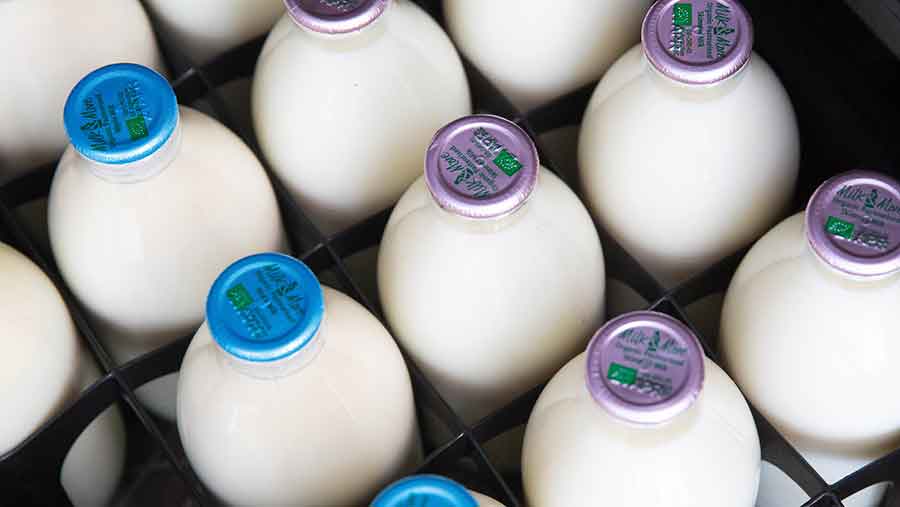Anti-dairy adverts from Oatly called out for false claims
 © Tim Scrivener
© Tim Scrivener Farmers have expressed their anger at a new campaign from Swedish oat milk manufacturer Oatly, which claims livestock farming is more damaging to the planet than transport.
The company has launched a series of four TV adverts as part of its “Help Dad” campaign which aims to “shame” the older generation and convince them not to drink cow’s milk, but to switch to plant-based alternatives.
See also: Myth buster – the BBC’s anti-meat programme examined
One such ad shows a father stocking up his fridge with cow’s milk in the middle of the night, only to be caught by his teenage son, who just looks at him with contempt and says: “Really?”.
Another shows a man watching TV with his family and reluctantly deciding to say “no” to milk in his tea, under pressure from his teenage children.
An accompanying tweet makes the claim that “the dairy and meat industries emit more carbon dioxide equivalent than all the world’s planes, trains, cars, boats etc combined”.
Criticism
But the suggestion has drawn sharp criticism on social media, with many farmers contesting the claim.
Leicestershire farmer and Farmers Weekly columnist Joe Stanley said that, as a farmer who actually grows oats and no longer milks cows, the adverts and campaign claims are “shocking”.
This is a lie.
All agriculture = 10% UK emissions
Cattle & sheep = 3.7%Transport = 27% @Ofcom @ASA_UK https://t.co/EvH50MmeID
— Joe Stanley (@JoeWStanley) January 17, 2021
South-west mixed farmer David Butler also berated the “unpleasant guilt-based messaging”. “A tyrannical son berating his dad for doing the grocery shopping while he sits about? The son would get a pretty dusty reply in this house! #PityThatDad”, he tweeted.
Data sources
With regards to UK, figures from the Committee on Climate Change suggests that transport actually accounts for 27% of greenhouse gas emissions, while agriculture produces 10% and livestock less than half of that.
But even at a global level, the figures are open to challenge.
The AHDB explained that, while old (2006) figures from the Food and Agriculture Organisation (FAO) suggested livestock around the world produced more greenhouse gasses than transport, this data was not comparing like-with-like and had since been discredited.
A more recent (2018) assessment by FAO livestock experts Anne Mottet and Henning Steinfeld concludes that “direct emissions from transport account for about 14% of all emissions from human activities, while direct emissions from livestock account for 5% of the total”.
Condemned
The Oatly campaign has been condemned by Dairy UK, which described the adverts as “in very poor taste” and “incredibly patronising and disrespectful to those male consumers they appear to be targeting”.
“The near immediate backlash they faced on social media from consumers, as well as those within the food industry, is clear evidence of this,” said a spokeswoman.
“The best thing Oatly could do is pull these ads to avoid causing further offence to the public.”
The company has been contacted for a response, which is still awaited.
Letter of complaint
A number of farmers say they have already made official complaints, both to the Advertising Standards Authority, and direct to the company.
Oxfordshire beef and arable farmer Frank Nixey is one of them. In his letter, he wrote: “I appreciate there is a market for all sorts of products in the UK and around the world. I actually grow oats and so am happy to see a demand for oat milk.
“My problem is with the spreading of lies and untruths about the meat and dairy industry. Surely you are better to put across and explain how good your product is, not to knock down the competition with lies?
“To say that the meat and dairy industry emits more carbon dioxide than the world’s planes, trains, cars, boats etc, is wildly inaccurate, not true and not very helpful.”
His letter goes on to explain that, unlike transport, livestock farming creates a virtuous circle, with carbon dioxide emitted by cows reabsorbed by plants, while much grassland farming takes place on land that would not be suitable for arable production.
“Meat and dairy are a good natural foodstuff for humans without being highly processed and, used in a sustainable way, will benefit not just humans, but also the climate of this planet,” the letter adds.
Anyone wishing to complain can contact the Advertising Standards Authority online. Oatly can be contacted by writing to Oatly UK, 81 Rivington Street, London, EC2A 3AY or emailing info.uk@oatly.com.
What the campaign says…
The Help Dad website offers a “guide to help dads quit dairy”.
“You’ll find facts, rhetorical manoeuvres, tips, recipes and a bunch of other stuff designed to help you get your dad on a more planet-friendly track, because, clearly, you are the guy’s best hope,” it says.
What is the source of the data?
The two papers referenced by Oatly are the 2013 FAO report by Gerber et al – Tackling Climate Change Through Livestock – A global assessment of emissions and mitigation opportunities – which puts livestock’s greenhouse gas (GHG) emissions at 14.5% and transport’s at 14%, and Edenhofer et al’s 2014 contribution to the fifth assessment report of the Intergovernmental Panel on Climate Change.
However, according to the AHDB, both have been superseded by the 2018 Anne Mottet and Henning Steinfeld report for the FAO – Cars or livestock: which contribute more to climate change? – which puts global livestock at 5% and transport at 14%, based on direct emissions.
Oatly initially cited Poore and Namecek’s 2018 report – Reducing foods environmental impacts through producers and consumers – on their website, though co-author Joseph Poore complained that he had not made any comparison of GHG emissions between the different sectors. Oatly has now removed the reference.
